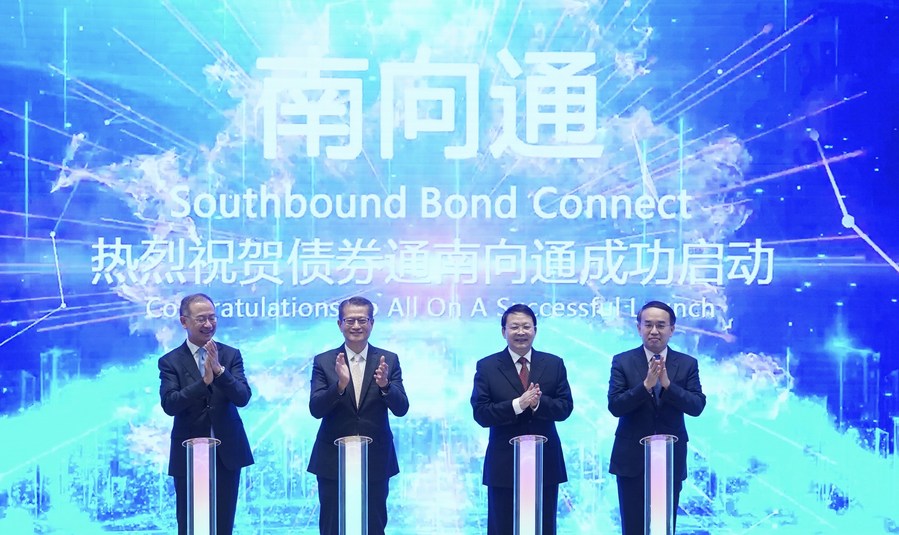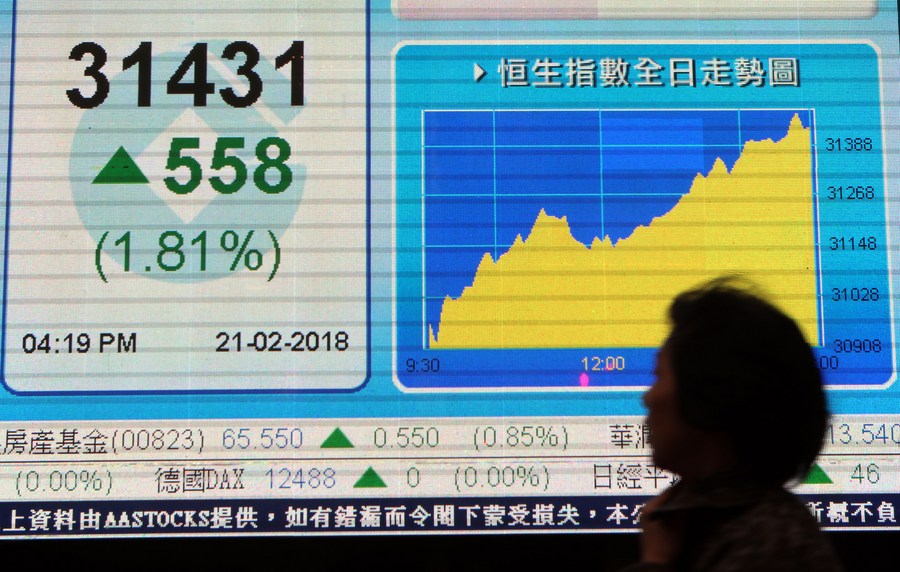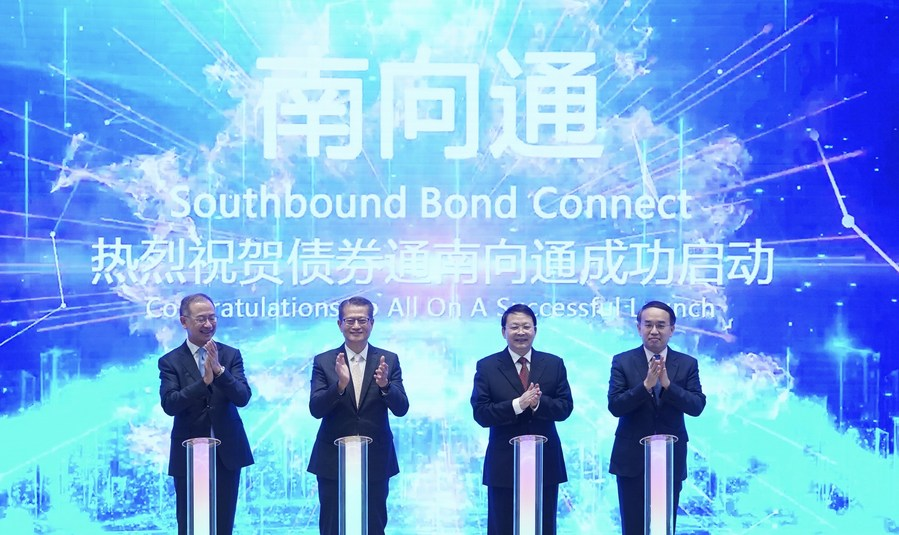BEIJING, July 6 (Xinhua) -- Five years ago, China approved a bond connect program between the mainland and Hong Kong, allowing investors from both sides to trade bonds on each other's interbank markets. The Northbound Trading channel under Bond Connect was launched initially in July 2017 while the Southbound Trading channel under the program came in September 2021, completing the two-way connection of the bond markets.

Photo taken on Sept. 24, 2021 shows the launching ceremony of the Southbound Bond Connect scheme in south China's Hong Kong. (Xinhua/Lyu Xiaowei)
"Bond Connect has been operating in a stable and efficient manner over the past five years, since it was launched in 2017 upon the 20th anniversary of Hong Kong Special Administrative Region (HKSAR). As a significant milestone of the mainland's financial market reform, Bond Connect has continued to help drive the mainland financial market's opening up and reinforced Hong Kong's role as an international financial center", said Pan Gongsheng, deputy governor of the People's Bank of China (PBOC) at the program's anniversary ceremony held on Monday.
-- Faster financial opening-up under Bond Connect
"Bond Connect serves as 'bridge' and 'bond' linking financial markets of the Chinese mainland and the rest of the world," said Shi Jiachen with Deutsche Bank, adding that the achievements of the program are the epitome of the opening-up of China's financial market and the RMB internationalization.
Overseas entities' holding of Chinese bond has been on the rise over the past five years, with an average annual growth rate of about 40 percent. Global investors have taken Bond Connect as a pivotal channel to invest in the mainland's bond market as indicated by the figure of their Chinese bond holding, which had risen to 3.74 trillion yuan as of the end of May, up 2.81 trillion yuan since the launch of the program.
By the end of May, the program has attracted 3,483 global investors, including 78 of the top 100 asset management companies in the world, and its services have expanded to 36 countries and regions, data released by Bond Connect Co., Ltd. showed.
Trading records have also been refreshed. A total of 6506 bond deals worth 591.1 billion yuan (about 88.13billion U.S. dollars) were made under Bond Connect last month, with an average daily turnover of 31.1billion yuan.
-- Strong appeal of RMB-denominated assets
In a nod to the unremitting opening-up of China's financial market , major global benchmarks like MSCI, FTSE Russell, and the S&P Dow Jones have included the A-shares and strengthened their weightings, while major foreign-funded rating agencies, such as Fitch, S&P, have accessed Chinese market. And the issuance of panda bonds, yuan-denominated debts sold by overseas issuers in China, has exceeded 600 billion yuan.
Noting that overseas institutions showed an improved presence in many fields in China's bond market, Rong Yihua, an official with PBOC Shanghai Head Office said that the country's bond market has become increasingly internationalized.
By the end of May, a total of 1038 overseas institutional investors from over 60 countries and regions have entered China's interbank bond market, including the US, Canada, UK, France, Germany, Italy, Japan, Singapore and Australia.
The Chinese renminbi (RMB) also showed strong presence in global reserve and payment.
The International Monetary Fund (IMF) in May lifted the currency's weighting in the Special Drawing Rights (SDR) from 10.92 percent to 12.28 percent, bringing its weighting to the third place, only after the U.S. dollar and the euro. A recent survey by Swiss Re confirmed RMB's enhanced role as a reserve currency, which shows that 85 percent respondents have invested or considered to invest RMB.
In terms of global payment, the latest data showed the RMB gained a larger share of 2.15 percent in global payment in May, retaining its position as the fifth most active currency for global payments by value, according to the Society for Worldwide Interbank Financial Telecommunication (SWIFT), a global provider of financial messaging services.
Explaining the reasons for these strong performance, Shi said that the stable Chinese economy and the outstanding RMB fundamentals contributed to RMB assets' role as safe-haven assets in the global markets
-- New cooperation arrangements for further connectivity
Pan announced the development of Swap Connect and enhanced currency swap agreement at the anniversary ceremony of Bond Connect.
Swap Connect is a new mutual market access program between the Chinese mainland and the Hong Kong Special Administrative Region in the interbank interest rate swap markets. Building on the success of the Bond Connect, the new arrangement would allow investors to better manage interest rate risks, in which they could execute interest rate derivatives transactions through infrastructural connectivity between the two sides' financial market.

A pedestrian passes a screen of a bank in Central of Hong Kong, south China, Feb. 21, 2018. (Xinhua/Li Peng)
Swap Connect would provide global investors with a more convenient risk management tool and RMB interest rate swap and settlement process, said Wesley Yang, vice governor and head of Financial Markets at Standard Chartered Bank China.
The enhanced currency swap agreement between the PBOC and the Hong Kong Monetary Authority (HKMA) represents the first long-standing swap agreement signed by the PBOC. The long-standing arrangement, with no need for renewal, was expanded in size from 500 billion yuan (about 75 billion U.S. dollars) to 800 billion yuan.
Industrial experts welcomed the launch of Swap Connect and the enhanced currency swap agreement, saying that these arrangements will advance efficiency of both sides' financial market and enhance HKSAR's role as international financial center and offshore RMB hub.
Development experience of China's financial market shows that wider opening-up injects great force to the goal of building a market-oriented, law-based and internationalized financial market in China, and represents a key move to harness finance to better serve the real economy, said Pan.
(Edited by Li Shimeng with Xinhua Silk Road, lishimeng@xinhua.org)




 A single purchase
A single purchase









